
Herodotus was a Greek historian and geographer from the Greek city of Halicarnassus, part of the Persian Empire and a later citizen of Thurii in modern Calabria, Italy. He is known for having written the Histories – a detailed account of the Greco-Persian Wars. Herodotus was the first writer to perform systematic investigation of historical events. He has been described as "The Father of History", a title conferred on him by the ancient Roman orator Cicero.
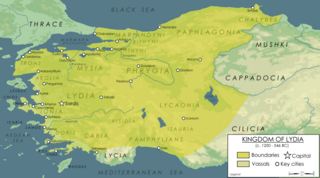
Lydia was an Iron Age kingdom situated in the west of Asia Minor, in modern-day Turkey. The ethnic group inhabiting this kingdom are known as the Lydians, and their language as Lydian and their capital was Sardis.
The 3rd millennium BC spanned the years 3000 to 2001 BC. This period of time corresponds to the Early to Middle Bronze Age, characterized by the early empires in the Ancient Near East. In Ancient Egypt, the Early Dynastic Period is followed by the Old Kingdom. In Mesopotamia, the Early Dynastic Period is followed by the Akkadian Empire. In what is now Northwest India and Pakistan, the Indus Valley civilization developed a state society.
The 27th century BC was a century that lasted from the year 2700 BC to 2601 BC.

Pamphylia was a region in the south of Asia Minor, between Lycia and Cilicia, extending from the Mediterranean to Mount Taurus. It was bounded on the north by Pisidia and was therefore a country of small extent, having a coast-line of only about 120 km with a breadth of about 50 km. Under the Roman administration the term Pamphylia was extended so as to include Pisidia and the whole tract up to the frontiers of Phrygia and Lycaonia, and in this wider sense it is employed by Ptolemy.

Leonidas I was a king of the Greek city-state of Sparta, and the 17th of the Agiad line, a dynasty which claimed descent from the mythical demigod Heracles. Leonidas I was a son of King Anaxandridas II. He succeeded his half-brother King Cleomenes I to the throne in c. 489 BCE. His co-ruler was King Leotychidas. He was succeeded by his son, King Pleistarchus.
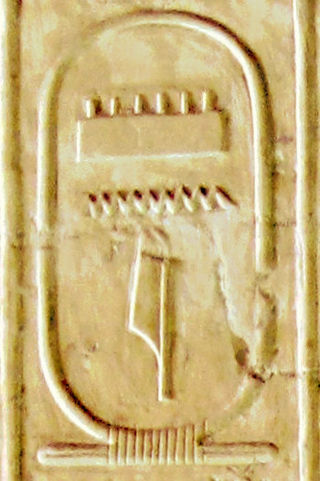
Menes was a pharaoh of the Early Dynastic Period of ancient Egypt, credited by classical tradition with having united Upper and Lower Egypt, and as the founder of the First Dynasty.

The Greco-Persian Wars were a series of conflicts between the Achaemenid Empire and Greek city-states that started in 499 BC and lasted until 449 BC. The collision between the fractious political world of the Greeks and the enormous empire of the Persians began when Cyrus the Great conquered the Greek-inhabited region of Ionia in 547 BC. Struggling to control the independent-minded cities of Ionia, the Persians appointed tyrants to rule each of them. This would prove to be the source of much trouble for the Greeks and Persians alike.
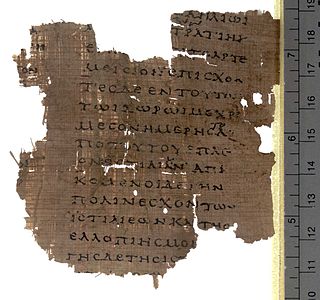
The Histories of Herodotus is considered the founding work of history in Western literature. Although not a fully impartial record, it remains one of the West's most important sources regarding these affairs. Moreover, it established the genre and study of history in the Western world.

Phocaea or Phokaia was an ancient Ionian Greek city on the western coast of Anatolia. Greek colonists from Phocaea founded the colony of Massalia in 600 BC, Emporion in 575 BC and Elea in 540 BC.

Miltiades, also known as Miltiades the Younger, was a Greek Athenian citizen known mostly for his role in the Battle of Marathon, as well as for his downfall afterwards. He was the son of Cimon Coalemos, a renowned Olympic chariot-racer, and the father of Cimon, the noted Athenian statesman.

Amri is an ancient settlement in modern-day Sindh, Pakistan, that goes back to 3600 BCE. The site is located south of Mohenjo Daro on Hyderabad-Dadu Road more than 100 kilometres north of Hyderabad, Pakistan.
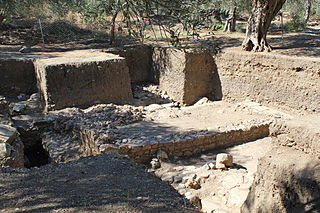
Antandrus or Antandros was an ancient Greek city on the north side of the Gulf of Adramyttium in the Troad region of Anatolia. Its surrounding territory was known in Greek as Ἀντανδρία (Antandria), and included the towns of Aspaneus on the coast and Astyra to the east. It has been located on Devren hill between the modern village of Avcılar and the town of Altınoluk in the Edremit district of Balıkesir Province, Turkey.

Ancient Aethiopia, first appears as a geographical term in classical documents in reference to the upper Nile region of Sudan, areas south of the Sahara, and certain areas in Asia. Its earliest mention is in the works of Homer: twice in the Iliad, and three times in the Odyssey. The Greek historian Herodotus uses the appellation to refer to such parts of sub-Saharan Africa as were then part of the known world.

The Achaemenid Empire or Achaemenian Empire, also known as the First Persian Empire, was the ancient Iranian empire founded by Cyrus the Great of the Achaemenid dynasty in 550 BC. Based in modern-day Iran, it was the largest empire by that point in history, spanning a total of 5.5 million square kilometres. The empire spanned from the Balkans and Egypt in the west, West Asia as the base, the majority of Central Asia to the northeast, and the Indus Valley to the southeast.
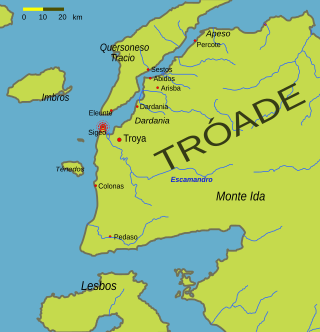
Sigeion was an ancient Greek city in the north-west of the Troad region of Anatolia located at the mouth of the Scamander. Sigeion commanded a ridge between the Aegean Sea and the Scamander which is now known as Yenişehir and is a part of the Çanakkale district in Çanakkale province, Turkey. The surrounding region was referred to as the Sigean Promonotory, which was frequently used as a point of reference by ancient geographers since it marked the mouth of the Hellespont. The outline of this promontory is no longer visible due to the alluvial activity of the Karamenderes which has filled in the embayment east of Yenişehir. The name 'Sigeion' means 'silent place' and is derived from Ancient Greek σιγή (sigē), 'silence'; in Classical Antiquity, the name was assumed to be antiphrastic, i.e. indicating a characteristic of the place contrary to reality, since the seas in this region are known for their fierce storms.
Canae was, in classical antiquity, a city in ancient Aeolis, on the island of Argennusa in the Aegean Sea off the modern Dikili Peninsula on the coast of modern-day Turkey, near the modern village of Bademli. Today Argennusa has joined the mainland as the Kane Promontory off the Dikili Peninsula. Canae is famous as the site of the Battle of Arginusae in 406 B.C.













